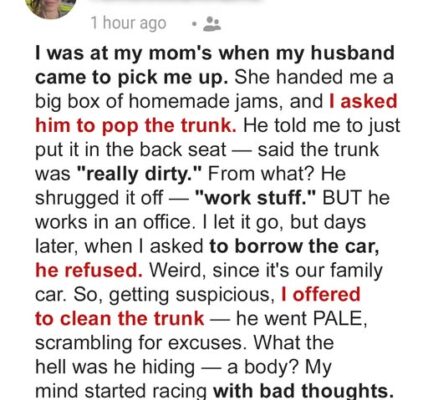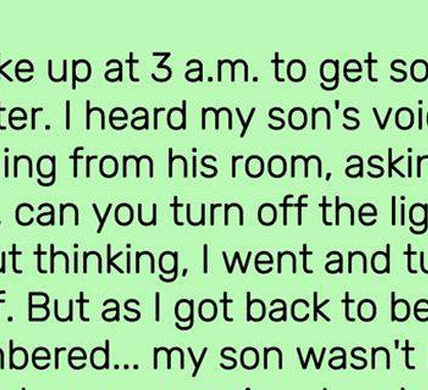My dad ate dinner with us every night for three years and never noticed my plate was always empty. My mother only wanted to control one of her children
For three years, my father sat at the dinner table with us every evening — and never once realized that my plate stayed untouched.
He never noticed how I just moved food around with my fork. Never questioned why I drank so much water but barely ate. Never asked why I grew quieter as the months went by.
Because my mother was a master of control.
And I was her favorite experiment.

The Lie That Started It All
I was eleven when the first lie was told.
We were at the dinner table — my dad telling one of his cheerful work stories, my brother laughing through a mouthful of mashed potatoes. Then suddenly, my father looked at me.
“Why is Lauren’s plate empty?” he asked casually.
Before I could answer, my mother’s nails dug sharply into my shoulder — a warning without words.
Her voice came out soft, almost sweet, like sugar concealing poison.
“She already ate,” she said with a smile. “Had a big snack after school, didn’t you, honey?”
I nodded, because if I didn’t, the punishment would come later.
That night, once the dishes were done and my father was watching TV, she dragged me into the kitchen.
“You almost ruined dinner,” she hissed. “You have no discipline. Do you want to end up like them? Fat, slow, ordinary?”
I didn’t know who them was — only that I never wanted to find out.
The Closet and the Scale
By thirteen, the ritual was carved into my life like scripture.
Every morning at 6:55 a.m., while Dad showered, Mom would grab my wrist and lead me into her walk-in closet.
It smelled of perfume and control — Chanel and power.
Behind her row of silk blouses sat her altar: a gleaming digital scale, always waiting.
I’d step onto it barefoot, the cold metal biting my skin.
“Sixty-five pounds,” she’d announce, her tone clipped. “Up two pounds from yesterday. No breakfast or lunch today.”
Once, I tried to reason with her.
“But Mom, the doctor said I’m growing.”
Her expression froze, then she smiled — that dangerous kind of smile.
“Growing is fine. Expanding is not.”
Living on Fear and Air
Food became a negotiation. Every bite needed permission; every meal turned into a test.
She’d prepare beautiful plates — roasted chicken, pasta, vegetables — and serve everyone except me. If Dad noticed, she’d slip easily into character:
“Lauren’s not hungry tonight. She’s learning self-control.”
When he traveled, the rules tightened. No dinner at all. Just water — and her voice echoing in my head:
“Real women don’t crave. Real women conquer.”
By fourteen, my world had shrunk to numbers: pounds, calories, minutes on the treadmill. I learned to smile through hunger, to laugh when people said I was “so disciplined.”
No one knew I went to bed shaking every night.
The Perfect Family Illusion
On the outside, we were flawless — a successful father, a glamorous mother, two perfect children in a pristine home.
Every Christmas, we took matching family photos with polished smiles. As the camera clicked, Mom would whisper:
“Keep your chin up. You look thinner that way.”
To everyone else, we were the picture of perfection.
Behind closed doors, we were prisoners of her perfectionism.
My brother learned to disappear — to eat quickly and leave before she noticed him. But I couldn’t escape. I was the chosen one. The one she could mold, reshape, and control.
The Breaking Point
It happened on a rainy Thursday when I was fifteen.
I fainted again — this time at school.
When I woke up in the nurse’s office, my mother was there. Perfect hair, perfect coat, perfect lie.
“She’s just dehydrated,” she said with a charming laugh. “She gets that from me.”
The nurse frowned but didn’t press.
No one ever did.
That night, my father finally confronted her.
“She’s losing weight, Lisa. I can see it. She’s pale, exhausted — what are you doing to her?”
My mother’s eyes instantly filled with tears.
“You’re accusing me of hurting our daughter? How could you?”
Then she turned to me, trembling with false pain.
“Tell your father, sweetheart. Tell him Mommy takes good care of you.”
I opened my mouth — but no words came out.
Only the sting of her nails digging into my wrist under the table.
And again, I lied.
“I’m fine, Dad. I just need rest.”

The Secret I Couldn’t Keep
Two more years passed before the truth broke through.
I was seventeen when my guidance counselor, Ms. Greene, noticed the bruises on my arms. She called Child Protective Services that same day.
When they came, my mother smiled through every question, dripping charm and innocence. But this time, there was proof — hospital records, school reports, weight logs hidden in her vanity drawer.
She was ordered into therapy. I went to live with my aunt.
For months, I couldn’t eat without guilt. Couldn’t look in mirrors without hearing her voice:
“Sixty-five pounds. Up two pounds from yesterday.”
But slowly, with help, I began to eat again — to live again.
And for the first time, hunger wasn’t a sin. It was survival.
Years Later
I’m twenty-eight now. I eat dinner with my husband every night.
Sometimes I still flinch when someone asks, “Aren’t you hungry?”
But I remind myself — hunger isn’t shame.
It’s human.
My father and I have rebuilt what we lost. He still cries when he remembers those years.
“I should have seen it,” he says.
And maybe he should have.
But monsters like her don’t roar — they whisper.
The Lesson I Carry
What my mother called “discipline” was really control disguised as love.
What she called “care” was cruelty wrapped in guidance.
Now, when I see parents policing their children’s food, their bodies, their worth — I feel that same cold fear I used to feel in her closet.
Because I know what it’s like to live in a home where every meal is a test, every pound a sin, and every compliment hides a wound.
And I know one truth better than anyone:
Some scars are invisible — and some dinners never end, even after you leave the table.






